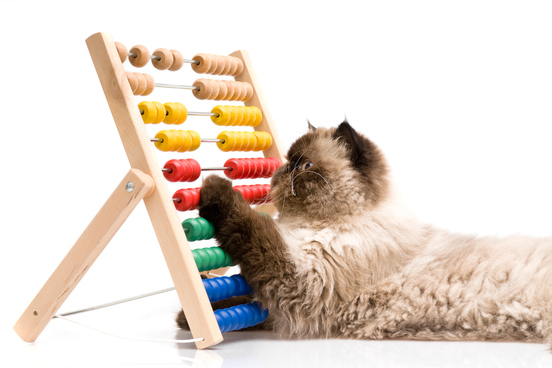
Arithmetic
In elementary school, after you learn to count, you learn the basics of arithmetic. This is the branch of mathematics concerned with the relationships between numbers, measurements, and computation, among other things. The ancient Egyptians and Babylonians are credited with the earliest documented evidence of accounting using numerals and place values.
The word arithmetic ultimately derives from the Greek noun arithmos, meaning "number," with stops along the way in Latin, Anglo-French, and Middle English.
Even the simplest math has a deep vocabulary. The four primary arithmetical operations are addition, subtraction, multiplication, and division. In addition, one or more addends are combined to produce a sum. In subtraction, a subtrahend is removed from a minuend to produce a difference.
In multiplication, a multiplicand is added to itself repeatedly the number of times indicated by a multiplier to produce a product.
In division, a dividend is split the number of times indicated by a divisor to produce a quotient, leaving a remainder if the dividend is not an exact multiple of the divisor.

Algebra
Algebra is a form of arithmetic in which abstract entities, usually represented by letters, are used in place of numbers. The value of an unknown number is deduced using reverse operations. In the simple equation 2x + 7 = 19, for example, arithmetical operations can be used to determine that the value of x is 6.
A 9th century Persian mathematician named Muhammad ibn Musa al-Khwarizmi is credited with establishing the basis for modern algebraic theory though his book Kitab al- jabr wa'l-muqabalah ("Book of Restoring and Balancing").
It is from the al-jabr (also translated as "the reduction") in the book's title that our word algebra derives. (In Arabic, al- functions as a definite article comparable to "the.")

Algorithm
An algorithm is a procedure for solving a mathematical problem in a finite number of steps that frequently involves repetition of an operation. A simple example of an algorithm is the determination of the greatest common divisor of two integers by breaking down the integers into its prime factors.
Algorithms are used in programming, such as search engines that comb a range of web pages for matching information.
Muhammad ibn Musa al-Khwarizmi also is credited for introducing the Arabic numeral system and decimal notation. The word algorithm (originally algorism) originally referred to this notation and was derived from the Latin form of al-Khwarizmi's name.

Logarithm
Not to be confused with algorithm, logarithm is defined as "the exponent that indicates the power to which a base number is raised to produce a given number." For example, the logarithm of 8 to the base 2 is 3, since 2 to the 3rd power (or 2 * 2 * 2) equals 8.
Formed from New Latin, logarithm adds to the Greek noun arithmos the prefix log- ("word, thought, speech, discourse"), from the Greek noun logos.

Geometry & Trigonometry
As their names imply, geometry and trigonometry are about measurement. Geometry deals with the measurement, properties, and relationships of points, lines, angles, surfaces, and solids (such as cubes, cones, and cylinders).
The study of geometry relies on using fixed principles called axioms (or postulates) to infer truths. Many of the axioms of elementary geometry are attributed to the Greek mathematician Euclid (c. 300 BCE).
Trigonometry is specifically about triangles and the measurements of angles in relation to the lengths of their sides in the terms of trigonometric functions (known as sine, cosine, tangent, secant, cosecant, and cotangent).
Geometry derives from the Greek words for "earth" and "measure," while trigonometry derives from words for "triangle" (trigōnon) and "measure."

Calculus
Calculus is an advanced category of mathematics concerned with the calculation of a rate that changes continuously (known as a derivative), such as the arc of a curve or the speed of a falling object.
Isaac Newton and Gottfried Leibniz are both credited with the invention of modern calculus in the 17th century.
In Latin, calculus means “pebble.” Because the Romans used pebbles to do addition and subtraction on a counting board, the word became associated with computation. Calculus has also been borrowed into English as a medical term that refers to masses of hard matter in the body, such as kidney stones.






